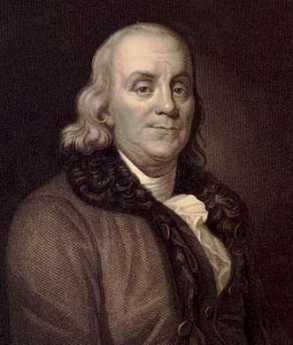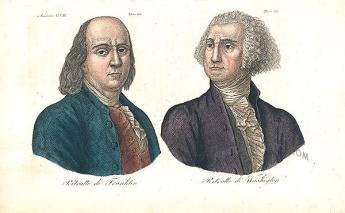Related Topics
Benjamin Franklin
A collection of Benjamin Franklin tidbits that relate Philadelphia's revolutionary prelate to his moving around the city, the colonies, and the world.

George Washington in Philadelphia
Philadelphia remains slightly miffed that Washington was so enthusiastic about moving the nation's capital next to his home on the Potomac. The fact remains that the era of Washington's eminence was Philadelphia's era; for thirty years Washington and Philadelphia dominated affairs.
...Authorship of the Constitution
There were seventy invited delegates to the Constitutional Convention. Fifty-five attended the sessions, and thirty-nine signed it. We believe the main contributions were made by seven or eight men. But you can never tell, for certain.
Right Angle Club 2012
This ends the ninetieth year for the club operating under the name of the Right Angle Club of Philadelphia. Before that, and for an unknown period, it was known as the Philadelphia Chapter of the Exchange Club.
Ben's Little Legacy

|
| Benjamin Franklin and George Washington |
ONE of the many compromises of the Constitutional Convention was to allow equal-sized blocs of people to choose their Representatives, but the State Legislatures of any size to appoint two Senators, in a bicameral Congress requiring affirmative votes from both bodies, for action. This was the first step in a separation of powers. After separation came apportionment: every state still got two Senators, but varying numbers of Representative districts would reflect population changes. The effect of this second step was to confer greater Senate power to small states because otherwise, a few states with large populations would probably always dominate the voting. (Shorthand for Constitutional scholars: favoring the House of Representatives means favoring big states.) When Franklin proposed a bargain to give the South time to solve its slavery problem, he needed to maintain balance. The small states were truculent about losing Senate power, so he had to give something else to the big states. The three big states of Massachusetts, Pennsylvania, and Virginia were very mindful that England had primarily targeted Boston, Philadelphia, and Yorktown for attack during the Revolution. Big states are paradoxically more anxious to unify with allies, to gain military strength, because enemy commanders seem to favor them as military objectives. Franklin's proposal was to allow the big states to control tax legislation, through the device of mandating that tax laws must originate in the House of Representatives. He may have known that eight states already had similar laws, but may not have realized such laws were regularly flouted. It's hard to be sure what Franklin knew because although he had once been Speaker of the Pennsylvania House, it was during a time it was a unicameral Legislature.
 ARTICLE 1, Section 7. All bills for raising revenue shall originate in the House of Representatives, but the Senate may propose or concur with amendments as on other Bills. 
|
| Washington's Gift to Franklin |
Experienced politicians in the Convention snorted with disgust. There were a dozen ways to get around such a provision, and nowadays the traditional one is for the Senate to attach a tax amendment to some bill which had originated in the House. Any House bill will suffice, and thus we have Senate-originated Medicare Amendments attached to House-originated bills whose first page purports to be legislation about highway construction. Medicare, don't you see, is an amendment to Social Security, which itself began as tax legislation. Any politician of standing could see his way through that. And even in 1787, the delegates could immediately think of ways to circumvent this little trick. When Chairman Rutledge of South Carolina returned his report from the Committee on Detail, it included Franklin's gift to the big states. His fellow delegate from South Carolina Charles Pinckney immediately proposed a friendly motion to delete the rule. Edmund Randolph of Virginia however, felt the big states "should at least get what they had been promised", thereby upsetting others who felt Randolph was being indelicate. So George Washington stepped out of the shadows and supported Randolph, his long-term neighbor, and friend in the Virginia caucus. The matter was then referred to the Committee on Postponed Parts. After a decent interval, it was reported out of the second committee and adopted. After all, with Washington and Franklin as supporters, it would be embarrassing not to pass an inconsequential motion.
Originally published: Wednesday, July 25, 2012; most-recently modified: Friday, September 20, 2019